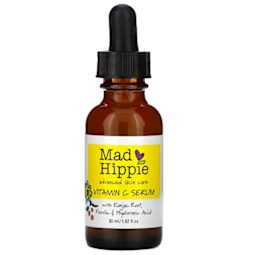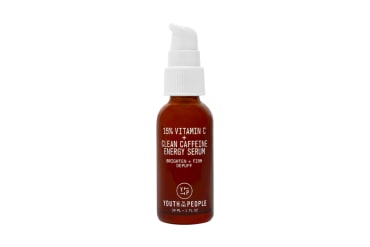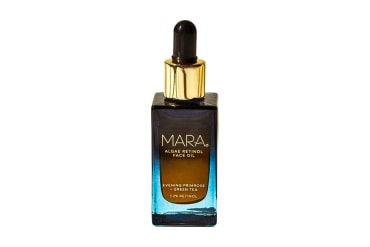Want Radiant, Youthful-Looking Skin? Consider This Combo
Who doesn't want a brighter glow?


Beauty & Health Editor
Beauty & Health Editor
Hannah Frye is the Beauty & Health Editor at mindbodygreen. She has a B.S. in journalism and a minor in women’s, gender, and queer studies from California Polytechnic State University, San Luis Obispo. Hannah has written across lifestyle sections including beauty, women’s health, mental health, sustainability, social media trends, and more. She previously worked for Almost 30, a top-rated health and wellness podcast. In her current role, Hannah reports on the latest beauty trends and innovations, women’s health research, brain health news, and plenty more.
Image by ohlamour studio / Stocksy September 16, 2024 We carefully vet all products and services featured on mindbodygreen using our Our selections are never influenced by the commissions earned from our links. With all of the buzzy skin care staples out there (hyaluronic acid, niacinamide, etc.), it's only natural to want to reap the benefits of them all. However, as many beauty fans know: Layering skin care ingredients is a very tricky venture, especially if you're dealing with notoriously unstable actives. Case in point: vitamin C and retinol. Both of these ingredients offer wonderful and unique skin-related benefits, but can (and should) they be used together? We asked the pros to find the answer. 
What is vitamin C?
First, let's be clear on what each of these products can do. As clean cosmetic chemist Krupa Koestline explains, "Vitamin C is a potent antioxidant capable of neutralizing oxidative stress caused by pollution, UV, and other environmental stressors."
Oxidative stress can lead to a plethora of skin-related troubles, including the loss of collagen fibers resulting in skin sagging, fine lines and wrinkles, and texture changes. Luckily, vitamin C can be of assistance. Here, a quick list of benefits, according to Koestline:
What is retinol?
The term "retinol" refers to a compound derived from vitamin A. Technically, retinol falls under the umbrella category of "retinoids," which include all vitamin A derivatives.
Some retinoids, like tretinoin and Tazorac, are stronger and thus require a prescription. However, you can also find gentler over-the-counter retinols that have similar skin care benefits (those are the ones we are talking about today).
Retinoids, retinol included, work by increasing cell turnover in the skin and promoting collagen production. Here, some notable benefits of retinol:
Can you use them together?
So now you know what retinol and vitamin C do for the skin separately, but what happens when you combine them? Well, you might just hit the jackpot of skin care when utilizing the power of both products, but it's important to do it right.
Board-certified dermatologist and YouTube content creator Andrea Suarez, M.D., FAAD, cautions against using the two at the same time. "The two ingredients and their respective formulations can sometimes be very irritating if used together," she says. Not to mention, layering them one after the other might render them ineffective.
As a general rule of thumb: Use retinol at night and vitamin C in the morning. "To get the most benefit from vitamin C, you want to use it during the day to protect the skin while exposed to environmental stressors such as the sun and pollution," celebrity esthetician and skin expert Shani Darden tells mbg. On the flip side, retinol can promote cell turnover while you snooze. Not to mention, it's much safer to apply retinol in the evening, as it can sensitize your skin to sun exposure.
Here's a quick breakdown, if you'd like to see the routine all planned out:
Vitamin C and retinol are most often found separately since they are each potent actives in their own right, but some formulas do combine both steps into one. Modern advancements in skin care technology can safely combine certain forms of vitamin C and retinol, and Suarez notes that these products are specifically formulated to be applied in unison.
That being said, it may be best to use these combo products at night, given the photosensitivity risk that comes with retinol.
mbg's picks for vitamin C + retinol products:
Best affordable vitamin C: Mad Hippie Vitamin C Serum

Pros
AffordableAlso includes hyaluronic acidCon
Not sold in many storesKey ingredients:
hyaluronic acidglycerinvitamin Evitamin C
This one is an automatic winner, thanks to the wonderful cocktail of ingredients. Vitamin C is accompanied by plumping hyaluronic acid as well as vitamin E, which works to stabilize the formula and hydrate the skin. If you're looking to combine a few steps in your morning routine, definitely consider this serum from Mad Hippie.
Best splurge vitamin C: Youth to the People 15% Vitamin C + Clean Caffeine Energy Serum

Key ingredients:
caffeinepassion + dragon fruit extractvitamin C
If you wake up puffy in the morning, you should be pressing "Buy now" immediately. This serum combines plant-derived caffeine from yerba mate and guayusa to help visibly reduce puffiness and rehydrate the skin. A whopping 15% dose of vitamin C helps to brighten the complexion and protect from environmental stressors throughout the day.
Advertisement
This ad is displayed using third party content and we do not control its accessibility features.
Best splurge retinol: MARA Evening Primrose + Green Tea Algae Retinol Oil

Pro
Jam-packed with nutrientsKey ingredients:
algae extractsfermented green tea extractretinolevening primrose
This luxury night oil encourages clear, radiant skin. A strong 1.2% retinol, and natural sources of vitamin A to rejuvenate and reveal healthy youthful-looking skin while algae extract moisturizes the skin and reduces fine lines and wrinkles alike. This phytonutrient powerhouse contains evening primrose, fermented green tea, and hemp-derived cannabis oil. It may be pricey, but you will be getting a bang for your buck with this multitasking face oil.
Best affordable retinol: Naturium Retinol Complex Serum

Con
Not the best for sensitive skinKey ingredients:
retinolbakuchiolvitamin E
Retinol products are notoriously pricey, which is why finding this high-quality, affordable serum feels like striking gold. Naturium blends encapsulated retinol with popular retinol alternative bakuchiol. Vitamin E helps to stabilize the retinol cocktail and hydrate the skin. Together, these actives encourage a radiant, smooth, and even complexion.
Advertisement
This ad is displayed using third party content and we do not control its accessibility features.
The takeaway
Vitamin C and retinol are two potent skin care ingredients that have been around forever, yet there's still some confusion in terms of layering. The bottom line? Both of these ingredients have a worthy place in your skin care routine but should be used separately.
Remember: Use your vitamin C followed by SPF in the morning and your retinol followed by moisturizer in the evening. If you want to learn even more about which ingredients you should and shouldn't layer, here's a quick guide.

 Aliver
Aliver 































